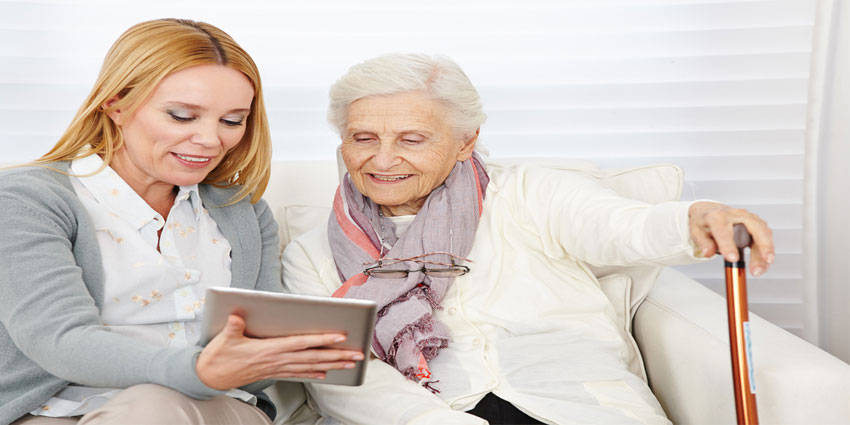Aging safely is a natural concern for many seniors, many of them still want to live independently. It’s also in the minds of family members and caretakers to be charged with ensuring their well-being.
Avoiding slips, falls, break-ins, and other accidents is just as important as implementing wellness measures. These can be remedied through the tech components, facilitating open communication, accident avoidance, and daily living management.
Install Safety and Accessibility Equipment
Install safety equipment that makes it safe to use the rooms and appliances in your home, like:
- Install non-slip strips for bathtubs and showers and add grip bars to showers and toilets for extra stability.
- Replace a regular toilet with a modern and raised seat.
- Replacing door knobs with lever handles that are easy to turn and pull.
- Install nightlights for your home’s lighting to improve visibility.
- Install automatic stairs or lifts.
- Install smart devices and appliances.
- Install security cameras
Home Security System for Seniors Security
Here are some top safety tips regarding common hazards faced by seniors, along with useful data about technology that can you to keep your elder family members safe:
1. Eliminate Slip & Fall Risks
This is one of the most common home safety concerns. Seniors mobility decreases with aging, they can easily slip or fall on even a good surface if there’s any hazardous items on that surface.
Check your home for hazardous items. These include doormats, loose carpeting, rugs and other obstructions, such as furniture or clutter.
2. Install smart devices
Technologies like motion-sensor lighting and smart technologies can also help them. This includes Amazon Alexa or Google Home to facilitate commands, such as turn lights on or off, turning off AC, television and other devices.
3. Install Smoke Alarms & Carbon Monoxide Detectors
These must be in working order. Almost three of every five deaths from home fires, resulted from fires in homes with no smoke alarms.
Installing a proper smoke and carbon monoxide detector is a two-fold process. It provides protection against this odorless gas. Testing and maintenance of these devices are also important factors. Smoke alarms should be tested at least once per month and replaced about every 10 years.
General Security offers alarm monitoring that alerts you and your loved ones of smoke or carbon monoxide. This also connects to emergency services automatically.
4. Secure Windows & Doors
Securing windows and doors are a security and wellness measure. For those elders, especially those who live alone, the threat of a break-in is more prevalent.
It’s important that these areas are highly secured and have added protection, such as security screens, working window and door locks, and glass break sensors.
5. Smart Locks
Locking doors and windows can be challenging for older ones. Installing smart locks can grant peace of mind through a secret code programmed through any app.
These locks can be remotely controlled with smart home automation. Set a specific time for doors to lock and unlock, so your loved ones remain safe.
6. Perform Regular Check-Ins
Wellness and healthy living are critical for old ones. Keep them regularly checked up. Consider adding wellness protective measures regularly for them.
There should be a person to take care of them, if they are living independently, for their safety and well- being.
7. Security Cameras
Implementing indoor, outdoor and doorbell security cameras is a key piece of the solution. These can prevent break-ins, thefts, can screen visitors and monitor daily living.
You can remotely monitor activities and facilitate check-ins from your device. You can also connect it through security apps which can provide you real-time alerts, if there is any suspicious activity. In an emergency situation it will help you to directly connect to local law enforcement or first responders.
8. Utilize Energy & Appliance Management
Always use smart automatic home appliances to avoid fire burns from appliances or overheating. These automatic appliances shut off automatically or you can set a timer to them. It can prevent from such cases like leaving a stove or oven on, faucets running, or abnormal heating and cooling settings.
9. Smart Thermostats
Smart thermostats can adjust the heating and cooling based on real-time weather conditions. And you receive notifications that home temperatures should increase or decrease above certain levels.
10. Install a Medical Alert System
A medical alert system is a must. Which makes them able to make contact with emergency services quickly.
12. Emergency contacts for Safety
It is important to have emergency contact information accessible to your loved ones. They must have these contacts within the home, listed in phone contacts, or memorized, like:
- Local police department
- Local medical department
- Fire station
- Family doctor
- Any other emergency services
13. Emergency medical kit
Always keep an emergency medical kit in the house, like:
- Thermometer,
- Syringes/needles (for the diabetic patients)
- Heat packs/ice packs
- Sterile cleaning solutions,
- Blood pressure and blood sugar monitor,
- Emergency medicines like Aspirin, inhalers for asthma, etc.
CONCLUSION: SAFETY FOR SENIOR CITIZENS
Making the appropriate accommodation and safety improvements are essential for seniors who are living independent. These measures will also help them with physical limitations. Take initiative to ensure that they are eating well and taking their medicines on time. It is recommended to visit the doctor regularly, for unexpected health issues. The younger members of the family owe them that much. As they spent their youth caring for us, they deserve nothing but the best care and all the joy in their old age.





